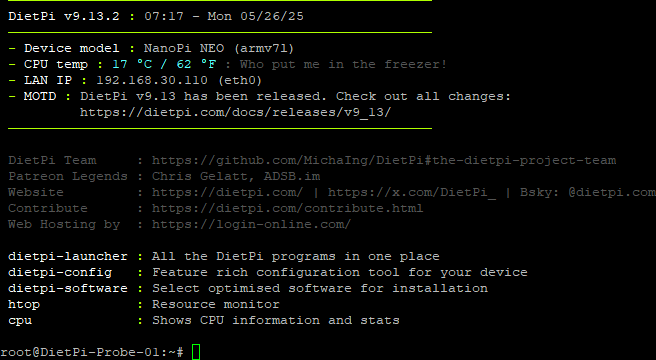 DietPi is een lichtgewicht besturingssysteem voor zogenaamde singleboardcomputers. Het is op Debian gebaseerd en geoptimaliseerd om maximale prestaties uit de kleine computers te halen. DietPi heeft daarnaast ook een groot aantal ready-to-run applicaties die kunnen worden geïnstalleerd. Hoewel de naam anders doet vermoeden is het niet alleen geschikt voor Raspberry Pi's, maar ook prima te gebruiken op hardware van bijvoorbeeld Odroid, Orange Rock en Pine. Versie 9.15 is uitgekomen en hier zijn de volgende veranderingen en verbeteringen in aangebracht:
DietPi is een lichtgewicht besturingssysteem voor zogenaamde singleboardcomputers. Het is op Debian gebaseerd en geoptimaliseerd om maximale prestaties uit de kleine computers te halen. DietPi heeft daarnaast ook een groot aantal ready-to-run applicaties die kunnen worden geïnstalleerd. Hoewel de naam anders doet vermoeden is het niet alleen geschikt voor Raspberry Pi's, maar ook prima te gebruiken op hardware van bijvoorbeeld Odroid, Orange Rock en Pine. Versie 9.15 is uitgekomen en hier zijn de volgende veranderingen en verbeteringen in aangebracht:
OverviewThe July 28th, 2025 release of DietPi v9.15 comes with support for Orange Pi 3 non-LTS, own up-to-date Unbound packages, and a script to upgrade Debian Bookworm systems to Trixie, the new Debian release scheduled for August 9th.
New imagesEnhancements
- Orange Pi 3: Support for the non-LTS version of this board was added.
Bug fixes
- Debian Trixie: In preparation for the Debian Trixie release, scheduled for August 9th, we further polished compatibility, we further polished compatibility, and created a script for a seamless distro upgrade from Bookworm to Trixie, similar to the script which allows upgrades from Debian Bullseye to Bookworm. All info can be found here: MichaIng/DietPi#7644
- NanoPi R5C: Its onboard Ethernet adapters are now assigned static MAC addresses as well, like done earlier for the other NanoPi mini routers last DietPi release.
- DietPi-Tools | DietPi-Display: Kernel command-line config detection has been widened to support more setups: GRUB is supported independent of the architecture, and settings are now changed in all found (and supported) config files, instead of just in the first.
- DietPi-Tools | DietPi-Display: The tool does now always show those settings previously applied, and reads the sysfs API only for settings which were not explicitly saved earlier. Previously, to faster detect non-functional settings and inconsistencies, even if settings were previously stored to the kernel command-line, the tool always read all values for enabled and connected displays from the sysfs API. This however means that when applying settings, exiting and restarting the tool, the previously applied settings are not shown anymore, and more importantly, all shown possibly different values were applied when changing only one setting. In the meantime, we know about inconsistencies when managing multiple displays, that e.g. on Raspberry Pi the rotation applied to one display, applies to all onboard display ports, and that the list of nodes from the sysfs API is neither consistently sorted, nor complete, entries can miss parameters, leading to duplicates, and on Raspberry Pi all modes with resolutions above the current one are simply missing. It makes more sense to consequently show those settings explicitly applied, and it can be seen on the display(s) whether/in how far they work or not.
- DietPi-Software | Moonlight (GUI): The game streaming client has been unlocked for all ARM and RISC-V systems, excluding only ARMv6 RPi models. Functionality may however depend on whether KMS and V4L2 drivers are available, and how well they work.
- DietPi-Software | Unbound: In favour of Unbound builtin data, the monthly cron job to download DNS root hints from https://www.internic.net/domain/named.root is removed, together with the
root-hints:setting in our default config. DNS root servers do by far not change that regularly, and Debian defaults do not make use of dedicated root hints either. This also closes one potential attack vector introduced by the monthly download, which relied on HTTPS authenticity only.- DietPi-Software | Unbound: We do now provide our own up-to-date Unbound package, though for now not automatically via our APT server. All details and install instructions can be found in the respective pull request, which can be also used for discussing the topic: MichaIng/DietPi!7632
- Debian Bullseye: Resolved an issue where APT updates failed because the
bullseye-backportssuite is not available on the main Debian repo anymore. It will be pulled from https://archive.debian.org/ now.- DietPi-Software | DietPi-Dashboard: Resolved an issue where the installing the nightly version, enforced on Raspberry Pi 5 and RISC-V systems, failed if no
unzipwas installed. Reason was a resultingHEADrequest, which is always failing with 404 on thenightly.linkURL we use to store dashboard nightly builds.- DietPi-Software | microblog.pub: Resolved an issue where the installation failed because of outdated dependencies. Since the project is not currently maintained, its Python dependencies are not updated. This is now done with Poetry within our installation code.
- DietPi-Software | Ampache: Resolved an issue where the install on Debian Bullseye systems always throw an error that the latest version could not be detected, hence the fallback URL was used.
- DietPi-Software | File Browser: Resolved an issue where the installation failed if the default software password had a length below 12 characters. The minimum password length requirement for File Browser is reduced automatically, to match the default software password if needed. However, we do encourage everyone to assign a long and strong default software password. 12 characters is not an unreasonable minimum.
- DietPi-Software | OctoPrint: Resolved a regression where the installation failed on RISC-V systems because of false
runusersyntax.As always, many smaller code performance and stability improvements, visual and spelling fixes have been done, too much to list all of them here. Check out all code changes of this release on GitHub: MichaIng/DietPi!7638


:strip_exif()/i/2007501682.png?f=thumbmedium)